- Home
- Sonya Hartnett
Golden Boys Page 2
Golden Boys Read online
Page 2
‘Another!’ marvels the man. ‘Quite a tribe!’
‘Oh, yes.’ Freya’s mother shakes her head with a kind of amused hopelessness. ‘There’s always another one coming.’
Already, after ten seconds, it is unpleasant to be waylaid in the shadeless carpark, people slamming doors around them, starting the engines of cars. It is fumy, gritty, over-warm. Peter, having tested the strength of his bindings, has subsided in calculation: time starts ticking to the moment he’ll start to scream. Freya smiles unendearingly. ‘Hello.’
‘Freya’s the eldest,’ her mother tells the strangers. ‘She’s – how old are you, Freya?’
‘Twelve,’ she says. ‘You know.’
‘Hello, Freya,’ says the woman.
‘Hello.’ She doesn’t care that the word sounds booted out of her.
‘After Freya there’s Declan, then Sydney, but . . .’ Elizabeth Kiley scans the crowd, ‘I can’t see them.’
‘They’re gone,’ says Marigold blandly.
‘And who’s this fine chap in the pusher?’ asks the man.
‘This is Peter. He’s the baby. Well, he’s nearly two.’
Peter looks up beseechingly. ‘He’s adorable,’ says the lady.
‘He breaks my stuff,’ says Dorrie.
‘That’s what baby brothers do, don’t they, Colt?’ The man gestures at the boy beside him, who stands in pristine silence. ‘Colt is twelve, the same as you, Freya.’
‘Uh.’ She’s already looked at this silent boy – he’s taller than she is, and more beautiful – and looked swiftly away. ‘I’m nearly thirteen,’ she clarifies.
‘I’m five,’ submits Dorrie.
‘I’m seven,’ says Marigold.
The man, who is tall and quite conspicuously handsome, who looks like an action-movie actor and whose presence only makes sense if the carpark is in fact a movie set, smiles radiantly and says, ‘Well, we’re delighted to meet you. I’m Rex Jenson, and this is my wife Tabby, and these are our sons Coltrane – Colt – and Bastian. We’ve moved into a house around the corner from you. It’s so nice to meet new neighbours.’
Freya and her mother smile as if they agree it is very nice; in truth such friendliness is disconcerting, a gust of too-strong wind. Freya has never been introduced to adults by their Christian names, and it’s as startling as hearing a swear-word. ‘It must be exhausting, shifting house,’ says Elizabeth, grappling. ‘I don’t think I could do it.’
‘Well, it’s not easy,’ the man agrees. ‘Nothing worth doing is, is it? But it will be worth it. It doesn’t hurt to shake your life up a bit. Change is always good.’
‘Oh, yes,’ says Elizabeth hazily. These people are too elegant, too assured: Freya knows they are making her mother nervous. She’s shunting the pusher back and forth so Peter flops like a fish.
‘It seems a lovely neighbourhood,’ says Tabby, the wife.
‘Oh, it is,’ Elizabeth says, and flounders on: ‘A few palings get pulled off fences sometimes. Some kids were going around smashing letterboxes – remember that, Freya? When was that? People were waking up to find their letterboxes all over the footpath.’
‘Ages ago,’ says Freya.
‘It was a while ago. A year or two ago.’
‘You get that kind of thing everywhere,’ says Rex. ‘It’s usually just kids.’
‘Bad kids,’ says Dorrie.
‘Kids letting off steam.’ Rex smiles. ‘Kids growing up. What’s a letterbox? It’s nothing. Something you can replace.’
Freya and her family gape at him, this man so kind and cavalier that he could forgive an awful act of vandalism. Freya’s been taught about forgiveness all her life, but she’s never actually met anyone inclined to practise it. She glances at the sons, Coltrane and Bastian, who stand beside their mother as placid as giraffes. Their father’s attitude must be wasted on them, they look incapable of committing any kind of crime. It is not possible to imagine them racing off to play the pinballs, which is undoubtedly what Freya’s brothers have done. The Jenson boys look like they should be etched into stained-glass windows, Sebastian pierced with arrows, the arrogant child lecturing the learned men. And suddenly Freya feels overcome, unreasonably hot and testy. It’s time to go, but they stand as if paralysed beneath the man’s beneficent smile. Elizabeth asks, ‘What do you do, Rex?’
‘I’m a dentist,’ he replies.
‘Ook,’ squeaks Marigold, and Freya likewise shrinks. There’s nothing worse than that sprawling chair, that tray of dainty tools.
‘Our dentist gives us lollies,’ says Dorrie.
‘He yelled at me for crying,’ says Marigold.
‘People must talk to you about teeth all the time,’ says Elizabeth.
‘I don’t mind,’ Rex answers. ‘I like teeth.’
‘Mum’s got false teeth,’ Dorrie informs him.
‘Dorrie!’ Elizabeth gags, but Freya notes that the man’s expression does not alter even minutely, that he’s deaf to anything someone doesn’t want him to hear. Freya herself can’t help smirking; glancing away, she meets the eye of the tall boy, Colt. He’s a slighter version of his film-star father, with the same thick chestnut hair – a mop of hair, like the lush pelt of an animal – worn long around his face, the same cheekbones and eyebrows and perfect nose. The younger boy has the same mahogany curls but his face is like his mother’s, a pink girly mouth, a small chiselled chin. Both have their father’s amber eyes and olive skin. They are well-dressed but the sense of quality goes deep, as if they are burnished right to the bone. Dorrie’s revelation has brought a smile to Colt’s face – Freya’s heart is just starting to be stirrable, and it stirs now. He’s smiling to her, and no one else in the world knows it. It sets her cheeks on fire, makes her head feel as if it’s not reliably where it used to be. She looks for help to the last cars moving past on slow-turning wheels, to the priest standing at the church doors with the remnants of the flock, his altar boys nowhere to be seen. There is nothing to do except flee. ‘I’m going home,’ she tells her mother. ‘Do you want me to take Peter?’
‘I’ll come!’ says Marigold.
Elizabeth says, ‘We’re all coming, we’re leaving now —’
‘I’m leaving now,’ says Freya.
‘Nice to meet you, Freya,’ says the man, the dentist, Rex Jenson. ‘Hopefully we’ll see you again soon.’
‘Uh,’ says Freya. And almost runs.
The church isn’t far from their home, which is the only good thing about it. Marigold skips to keep up with her sister, and the street streams past them as lines in the footpath, gates in fences, telephone poles planted in naturestrips. Jogging along, the girl tells Freya, ‘I liked that lady with a name like a cat.’
‘Tabby.’
‘Tabby.’ Marigold meows.
They pass a pole and a pole and another pole before Freya slows down. She wrinkles her nose, shakes her hair. ‘Those people were strange.’
‘How come?’
‘Well. He talked and talked, but the lady hardly said anything, and those boys just . . . stood there.’
‘Rude?’
‘Not rude,’ Freya judges. ‘Just strange.’
Marigold flies her palm above the peaked top of a brick fence, thinking about this. She’s young, but she is clever. ‘They were like those people in Mum’s knitting magazines.’
‘Exactly!’
‘Robots.’
They have reached Freya’s favourite house, which has a population of repellent concrete gnomes arranged in its front yard. Normally they’d slow or even stop, but Freya marches on. ‘Not robots. More like . . . aliens. Aliens trying to be humans.’
‘Creatures from the black lagoon,’ says Marigold, a movie fan.
‘They wear skin to look like people, but they don’t know how to be like people. They’re learning it.’
‘Strange!’ agrees Marigold. ‘Spooky.’
‘They are spooky. I mean, how did they know we live around the corner from them?’
‘They saw us walking to church. That’s what the man said, that they were walking behind us.’
This is plausible, which is disappointing, but Freya’s mind catches on the thought of Colt walking behind her, seeing her without her seeing him. She wishes she could go back in time to hover over that oblivious girl, tweak her hair, do something. She’d given Dorrie a cuff: knowing he must have seen it makes her feel harassed. ‘Well, why did they come here?’ she asks hotly. ‘Dentists are rich. They make lots of money. So why are they here?’
Her sister is too young to have much concept of the wider world – Freya knows for sure that she thinks the starving Africans live near enough to have her leftovers delivered to them on a plate – and asks, ‘Where should they be?’
‘Somewhere fancy! Where rich people live. Not here.’
Marigold ponders. ‘Maybe they don’t want to be fancy?’
‘Everyone wants to be fancy.’
‘Maybe they’re hiding.’
Freya smiles, pleased by the idea of aliens hiding in a nondescript suburb, laying out their plans on a speckle-topped kitchen bench. In truth she admires strangeness, and likes the new neighbours for it. She strides along, ignoring her sister’s scrabble to keep up, the air balmy as it weaves between her fingers, the sun a molten crown on her head. In a minute they’ll be home – once they cross this road she will be able to see the white post-and-rail fence of their house. If her brother Declan were a friend of Colt Jenson’s, he would bring him to the house sometimes. That’s a fact, but Freya knows little about the friendships of boys, how they meld or repel. A stringy green weed pokes over the path and she plucks it as she passes, swishes it violently. ‘Well, who cares,’ she says, and doesn’t answer when Marigold asks, ‘Who cares about what?’ Instead she will think of what she does know, the sturdy posts in her life. The year is coming to its close: soon the long school holidays will begin, stretching past Christmas and into the new year when, returning to classrooms, she will be starting secondary school, the baby of the schoolyard but a baby no more. She’ll be thirteen, a teenager, a creature of change. Already atheism sits inside her as comfortably as an egg in a nest. Next Sunday, when she refuses to go to church, her mother might rage, and to defend her position Freya will call upon the example of her father, which is something she would only do in an emergency and actually has never done before. And it will feel like a betrayal, using him against her mother. It will be a betrayal. The heart is wicked. Freya sighs.
They are within reach of their house – the spindly pine in the front yard, the clangy metal letterbox, the rut in the naturestrip where the station wagon cuts the corner; no sight makes her happier than the sight of home – when thoughts of her mother make Freya think of something else. She remembers Elizabeth saying, ‘There’s always another one coming.’
The words are written on one of the imaginary castle’s innumerable doors, a warped and ponderous door which requires a mighty shove before it will open; but when it does, and when Freya sees what’s behind it, the dismay dazes her.
Avery Price looks like a pixie found shifting through dandelions at the end of an overgrown garden; he should have wings jutting out his shoulderbaldes. He is small for his age and as translucently white as a pearl. Grey-eyed and fair-haired, with the pretty bowed lips of an infant, he is delicate, origami, he looks as if the only sustenance he requires is the occasional lettuce leaf sprinkled with sugar, and indeed he hardly eats anything more sustaining. Beneath the dainty façade, however, Avery is a wild child, the kind of boy-without-boundaries that other children enjoy having as a friend because there is nothing he will not do. He isn’t a complainer or in any way a sissy – he’s a smiler, a forgiver, there’s no meanness in him. Despite this, it’s evident that Avery is destined to follow a hard path through life – it’s as obvious as the bruises, the unbrushed hair, the dirt-lined fingernails and the cheap, inadequate clothes. There’s a sense that one shouldn’t grow too fond of him. He’s only eleven, and already the world is striving to be rid of him: when a dog rushes a fence and startles him into slipping off the gutter he’s been stepping along, this most minor accident skins a great gouge from his knee, such an over-abundance of damage that Syd and Declan Kiley are stunned.
He’s as tough as a boot, however. After hopping about on the road gasping, ‘Ow, ow,’ Avery sits on the kerb and inspects the wound with stoic curiosity. It’s a gruesome thing, rag-edged, pipped with stones, as broad as a boy’s palm. Crimson blood runs down his shin, crests his meatless calf and drips onto the road. Declan and Syd perch beside him, peering like scientists. ‘Bloody hell,’ says Declan.
‘I think I see bone,’ says Syd.
Declan winces. ‘That is really disgusting.’
‘Shut up!’ Syd screams at the dog, who’s still barking.
Someone from the house calls the animal in, and silence returns as it always does to these streets. Occasionally music will float beyond a window, and on weekends there will be the odd lawnmower, a random car horn beeping farewell; but typically there is this silence, and the surreal sense of living on after the rest of existence has ceased. It’s easy to believe the houses are empty, the occupants obliterated in some worldwide catastrophe, and that a boy like Syd Kiley can now rummage through strangers’ cupboards at leisure. He can hardly imagine anything he’d enjoy more, being the last person alive, with access to all that stuff. Now he cocks his head to gaze into the depths of Avery’s injury; this close he can smell a fleshiness, the taste of Avery raw. ‘Look at that. That’s a piece of road.’
They are a couple of blocks from Avery’s home; Declan asks, ‘Can you walk? Do you want me to go and get your bike?’
‘Or a wheelchair?’ suggests Syd. ‘A walking-stick? We could bring Peter’s pram.’
‘I’m OK,’ says Avery wanly. ‘I’ll just stay here a minute.’
‘I really can see bone,’ says Syd.
The three boys sit back on the naturestrip, their feet in the gutter. Avery’s sandals have thin soles and are slightly too small for him; by January, when summer has parched the grass into a crisp matting, the boys will be constantly stopping while Avery plucks prickles from his heels. Syd sits with his head bowed, the sunshine pressing firmly on the nape of his neck, thinking about this and about nothing. Between his own sandalled feet is a patch of bitumen, very grey and stony. With some work he assembles a wad of spit, and feeds it out as a sparkly thread. The thread breaks before it reaches the ground, marking the road with a dark spot shaped like a thorn. An interesting stone, clear like a diamond, catches his eye. He plucks it up and holds it above the gory swatch of Avery’s wound. His brother and his victim watch in silence, Declan’s blue eyes almost closed. Syd glances at Avery. ‘Dare me?’
‘Go on,’ says Avery.
‘I will,’ Syd threatens.
‘I said do it,’ Avery replies.
So Syd lets the stone drop, and it lodges in the cushion of blood and must sting, because Avery gives a shuddery flinch. The boys watch as the stone topples painstakingly from its perch, lolling along a bloody rivulet before dropping to the road wearing a ruby cap. Syd sniffs, satisfied. Declan buries his face in his folded arms. There’s a hoop of sunburn between his shoulders already.
There is no hurry to leave; they are headed nowhere. After a while Avery asks, ‘Are you going away for the holidays?’
‘Mum hasn’t said.’ Declan speaks into his knees. ‘Probably.’
Their mother always takes them somewhere, even if only for a week or two to a caravan park a few blocks back from the beach; on the weekend their father will drive down for the day and give the kids dolphin rides through the green water. Neither of the Kileys asks if Avery will likewise be going away. He is the child who haunts these streets, lurking in the places where pest species are found, the side door of the kiosk at the cricket ground, the bottle depot behind the Scouts’ hall, the grassy veins of unowned land that divide houses here and there. It’s possible he has never gone anywhere beyond the reac
h of his battered bicycle, and that he is obliged by the natural order to stay. If he were to leave, something would have gone wrong.
Syd feels a surge of impatience, shuffles his feet so his sandals chuff the road. He has no authority but he says, ‘Let’s go.’
Declan lifts his head and looks at Avery, who says, ‘Yep.’ But in the past minutes his knee has stiffened, and when he moves, he limps. He limps across the naturestrip to the footpath, hoisting and shuffling the damaged leg. It’s an injury, Syd is wearied to see, which is going to take a long time to heal, which will glaze over and break open and glaze and break for days before it finally scabs, and the scab will crack and pull, and weep. It will be their damp companion all summer, they’ll be witness to its entire lifespan. From the footpath Declan looks back at his brother. ‘You coming or not?’
Avery, too, has looked around, his bad leg posed on its toes. He freezes like that and says, ‘Oh, shit.’
And then, with a rodent’s instincts, he bolts: forgetting his pain he flees across the naturestrip and onto the open ground of the bitumen. The road sweeps downhill and around a broad corner, and Avery, following it, is gone like a dart shot from a blowpipe. Declan and Syd stand stupefied, staring after him. Then they look to see what their friend must have seen, and there’s Garrick Greene lumbering toward them like a cannonball. And Declan says, ‘Ah, cods.’
The boy arrives claret-faced and heaving – he’s heavy-set and nuggety, not built for speed. His burning sights are on the spot where Avery was last seen, but he cannot take another step and thunders to a halt beside the brothers. ‘I’m gonna kill that prick,’ he gasps.

 Butterfly
Butterfly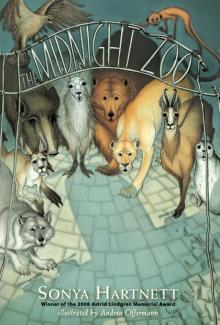 The Midnight Zoo
The Midnight Zoo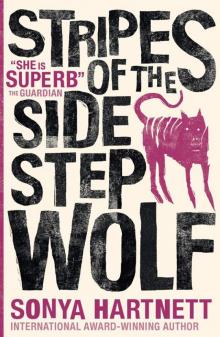 Stripes of the Sidestep Wolf
Stripes of the Sidestep Wolf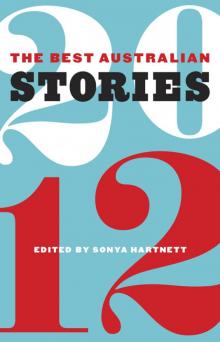 The Best Australian Stories 2012
The Best Australian Stories 2012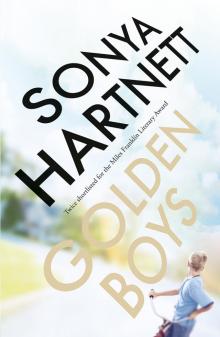 Golden Boys
Golden Boys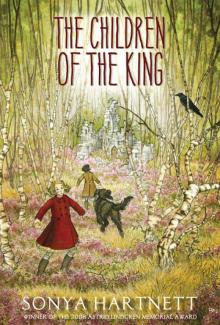 The Children of the King
The Children of the King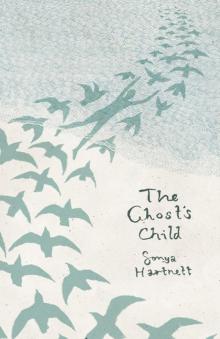 The Ghost's Child
The Ghost's Child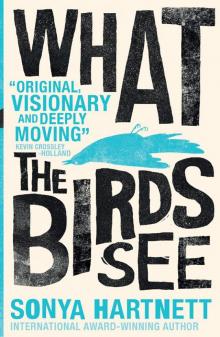 What the Birds See
What the Birds See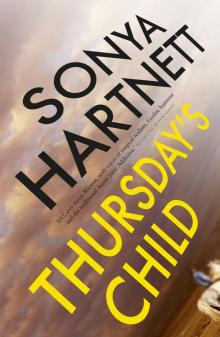 Thursday's Child
Thursday's Child